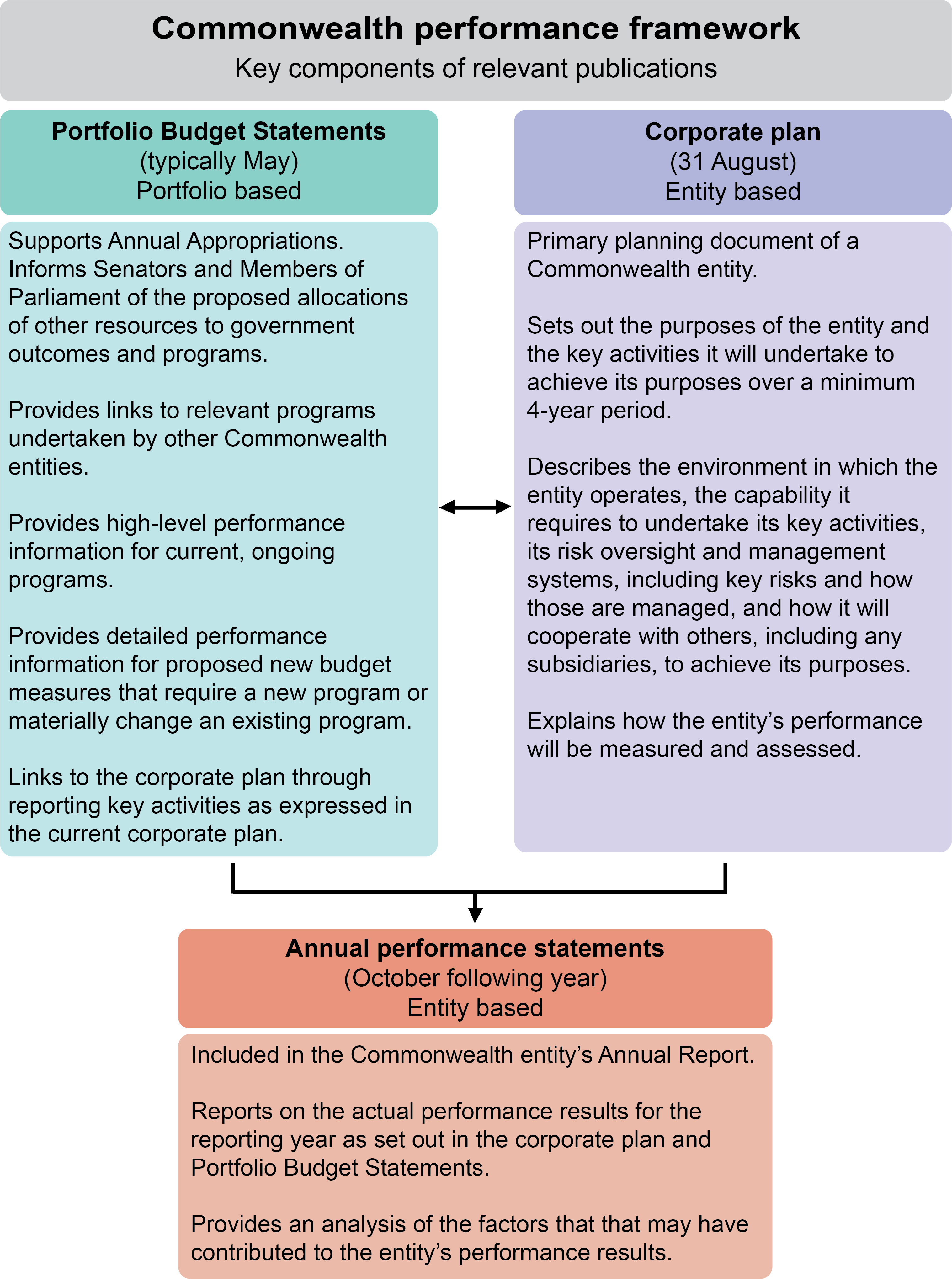A corporate plan is designed to be a Commonwealth entity's primary planning document. It provides Parliament, the public and stakeholders with an understanding of the purposes of an entity, which include its objectives, functions or role. It sets out how the entity undertakes its key activities and how it will measure performance in achieving its purposes.
Commonwealth performance framework
The corporate plan, section 2 of Portfolio Budget Statements (PBS) and the annual performance statements (included in annual reports) are the core elements of the Commonwealth performance framework.

Does my entity need to publish a corporate plan?
Most Commonwealth entities (non-corporate and corporate Commonwealth entities) are required, under section 35 of the Public Governance, Performance and Accountability Act 2013 (PGPA Act), to publish a corporate plan on their website.
Commonwealth entities must prepare their corporate plans in accordance with the requirements of section 16E of the Public Governance, Performance and Accountability Rule 2014 (PGPA Rule).
There are some exceptions to this requirement based on an entity's enabling legislation or other considerations such as national security or commercial factors (section 16E(4) of the PGPA Rule).
Entities with enabling legislation
The PGPA Act does not affect the operational independence of statutory entities as set out in their enabling legislation or the requirements of that legislation. If an entity’s enabling legislation contains requirements for corporate plans that are different from the requirements of the PGPA Act and Rule, the requirements of the enabling legislation takes priority.
The enabling legislation of a number of entities overrides the requirement to publish a corporate plan under the PGPA Act.
The enabling legislation of a small number of entities sets out alternate requirements for the preparation of their corporate plans. These include consultation, variation and approval requirements.
Intelligence, security and listed law enforcement agencies
Intelligence, security and listed law enforcement agencies covered by the PGPA Act may seek an exemption from corporate planning requirements.
The Minister for Finance may, by written instrument, modify requirements of the Act for an intelligence, security or listed law enforcement agency in relation to preparing and publishing a corporate plan under section 35 of the PGPA Act. The responsible Minister needs to write to the Minister for Finance to seek a modification.
Government Business Enterprises (GBEs)
Section 5 of the PGPA Rule identifies those Commonwealth entities that are GBEs for the purposes of the PGPA Act.
Commonwealth entities who are GBEs are required to prepare and publish a corporate plan in accordance with the requirements set out in section 16E of the PGPA Rule, together with any additional specifications in RMG-126 Government Business Enterprises (the GBE Guidelines). This document can take the form of a complete corporate plan, a redacted corporate plan, or a statement of corporate intent. The plan must address the minimum requirements as prescribed by the PGPA Rule. In doing so it should include sufficient non-confidential or non-commercially sensitive information to inform how the GBE plans to deliver on its purposes. For more information on corporate plan requirements for GBEs see RMG-126 Government Business Enterprises.
For further information on the GBE Guidelines, please contact GBE Policy.
What is a reporting period?
A corporate plan must be prepared at least once each reporting period. As a reporting period is usually a financial year (unless otherwise stated in an entity’s enabling legislation), this means that the corporate plan will usually be prepared each financial year.
Period of the corporate plan
The corporate plan must cover at least 4 reporting periods, commencing from the reporting period for which the corporate plan is prepared. This does not prevent an entity from producing a corporate plan that covers a longer period if that best addresses the entity’s specific requirements.
For example, a corporate plan prepared by an entity for the 2025–26 financial year would be titled as that ‘entity’s 2025–26 corporate plan’. That plan must cover at minimum 2025–26 to 2028–29.


